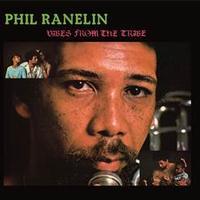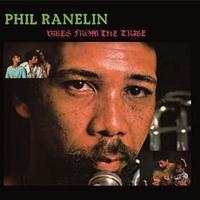180-gram vinyl
Remastering by Ray Staff at Air Mastering, Lyndhurst Hall, London
Phil Ranelin was a session trombonist recording with the likes of Steve Wonder before setting up the Tribe label with Wendell Harrison in Detroit.
Like other contemporary artist run labels like Strata East and Black Jazz, Tribe releases were characterised by a heady mix of post Coltrane free jazz, soul and funk, all informed by a strong political conscience.
Vibes From the Tribe is a fine record. The title track is lusciously, greasily funky and stands in pretty stark contrast to the kind of airbrushed fusion that was in vogue at the time. "Sounds from the Village" is even better (and dirtier), showcasing Ranelin's oily trombone gymnastics and a viciously fuzzed guitar solo. "Wife" features Phil's singing and is oddly reminiscent of Frank Zappa's writing on "Sleep Dirt;" an affecting, snaking melody topped off with a beautiful solo from the leader, whose playing here has the grace of Bob Brookmeyer coupled with the agility of George Lewis.
"He The One We All Knew" is the obligatory Coltrane tribute and is a trip into the kind of groove based free playing typical of Pharoah Sanders, though only really picks up when the band launch into post bop swing mode in the last six minutes or so, provoking another fine Ranelin solo. Bassist Ralph Armstrong is particularly strong here; his brief solo passages are a wonder of agility and tough lyricism that make me wonder why he's not better known. Other highlights come from the mellifluous flute of Wendell Harrison. Beautiful stuff, and it's good to know that Ranelin is still at work even now. Essential.
| 1. Vibes From The Tribe (Prelude) | |
| 2. Sounds From The Village | |
| 3. Wife | |
| 4. For The Children | |
| 5. Vibes From The Tribe (Encore) | |
| 6. He The One We All Knew (Parts 1 & 2) |
180-gram vinyl Remastering by Ray Staff at Air Mastering, Lyndhurst Hall, London "Four-and-a-half decades after the event, saxophonist Charles Lloyd's Love-In, recorded live at San Francisco's Fillmore Auditorium in 1967, the counterculture's West Coast music hub, endures as much as an archaeological artifact as a musical document. From sleeve designer Stanislaw Zagorski's treatment of Rolling Stone photographer Jim Marshall's cover shot, through the album title and some of the track titles ('Tribal Dance,' 'Temple Bells'), and the inclusion of John Lennon and Paul McCartney's 'Here There and Everywhere,' Love-In's semiology reeks of the acid-drenched zeitgeist of the mid 1960s, a time when creative music flourished, and rock fans were prepared to embrace jazz, provided the musicians did not come on like their parents: juicers dressed in sharp suits exuding cynicism. "It is likely that more joints were rolled on Love-In's cover than that of any other jazz LP of the era, with the possible exception of saxophonists John Coltrane's A Love Supreme (Impulse!, 1965) and Pharoah Sanders's Tauhid(Impulse!, 1967). Chet Helms, a key mover and shaker in the West Coast counterculture, spoke for many when he hailed the Lloyd quartet as 'the first psychedelic jazz group.' "It is to Lloyd's credit that, at least in the early stages of his adoption by the counterculture, he resisted dumbing down his music. The adoption stemmed from Lloyd's espoused attitude to society, his media savvy, his sartorial style and his sheer nerve in playing jazz in the temples of rock culture. He took the quartet into the Fillmore West three years before trumpeter Miles Davis took his into the Fillmore East-as documented on Live at the Fillmore East, March 6 1970: It's About That Time (Columbia) — by which time his pianist, Keith Jarrett, and drummer, Jack DeJohnette, were members of Davis' band (although Jarrett didn't appear at the 1970 gig). "So Love-In comes with a load of baggage, some of it less than fragrant. But as 45 minutes of music, it still has legs. Lloyd's vocalized tenor (and flute on two tracks) has Coltrane-derived muscle; the young Jarrett's lyrical and funky solos, particularly on his 07:55 showcase, the gospel-ish 'Sunday Morning,' his two featured originals ('Sunday Morning' and the soul jazz-ish 'Is It Really the Same?'), and his playing the strings of the piano directly with his hands, all remain compelling; McClure and DeJohnette are solid and inventive." — All About Jazz
| |||||||||||||||||||


